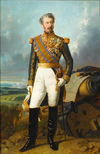Jacques Montrarde
| Jacques Montrarde | |
 | |
| Full name | Jacques Montrarde |
|---|---|
| AKA | Jaak Montrarde |
| Physical information | |
| Species | Human |
| Gender | Male |
| Biographical information | |
| Date of birth | 1617 AN |
| Residence(s) | 's Koningenwaarde, Batavia |
| Nationality | Batavian |
| Occupation |
Colonel of the Batavian Armed Forces Leader of the Radicalen |
Jaak Montrarde, born and better known as Jacques Montrarde, is a Batavian colonel of the Batavian Armed Forces from Gasconian descent. His family fled from Gasconje in 1582 AN, when the Third Kingdom of Batavia collapsed. They thought to be more safe from the oncoming chaos in the centre of the Empire than in its periphery. Nonetheless, the family had to move from town to town in the next two decades. Father Pierre Montrarde, a former lieutenant, eventually decided to settle in neighbourhood of Davignon.
In 1685, after having suffered electoral setbacks and with the outbreak of the Batavian Revolution, Jacques resigned his office of prime minister, and joined the Armed Forces in crushing the rebellions.
Early life
Jacques' father, by that time fired from active service and acting as a local militia commander, trained him to be though. Old classics, historical battles and military tactics were thought on a daily basis since his youth. That's why, when he reached the age of 18, Jacques left for 's Koningenwaarde (which was Jingdaoese territory) to join the Batavian Leeuwenbrigade. His travel across the Jingdaoese-Shirerithian border was dangerous, and when he finally arrived he was arrested as the authorities viewed him as potential spy.
Military service
Jacques grew up in military service, enjoyed a decent career in the Leeuwenbrigade and was sent on secret military missions to aid the Voortrekkers in establishing the Transbataafsche Vrystaat. By 1660 AN he had become a leading commander within the military forces which protected 's Koningenwaarde. The establishment of the United Batavian States in 1661 AN were met with enthusiasm by the population: a feeling which Jacques shared (especially after returning from his secret missions in the east). He was put on non-active because of his sentiments towards unifying Batavia under the Vinandist throne and left the Ultraroyalists when those decided to back David Kalirion as King. He called August Baerdemans a traitor of the Batavian and royalist cause.
His political views became more extreme with ageing: he objected against the idea of free trade with Shireroth, or any nation, even if the nation received most of its original territory back. In 1669 AN - with the Ultraroyalists removed from power - he was promoted to Colonel within the Armed Forces (mostly a bureaucratic function, as the Forces at that time were a mixed bag of local militias). His criticism of the government policies made further promotion impossible.
Political views
His staunch views concerning issues as the military and economy were perceived extreme by both allies and enemies: he was a staunch opponent of increasing the military budget and constructing a defensive line of fortresses, which was mainly meant against Shireroth. The economy, according to him, served the sole purpose of supplying the Forces with the much needed supplies. In foreign affairs he advocated the annexation of Gascony, even if it meant war against Stormark.
In 1670 AN he established his own small political party, the Radicalen (the radicals), which would participate in the 1674 Lagerhuis elections. His supporters are often called Montrardisten.